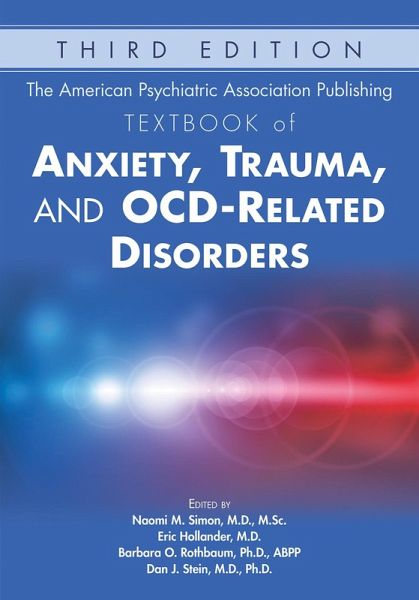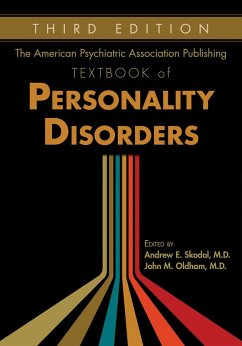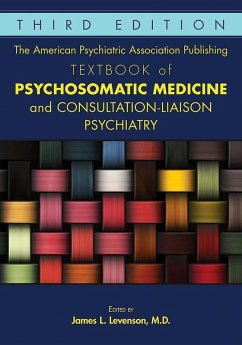
The American Psychiatric Association Publishing Textbook of Anxiety, Trauma, and OCD-Related Disorders (eBook, ePUB)
Versandkostenfrei!
Sofort per Download lieferbar
93,95 €
inkl. MwSt.
Weitere Ausgaben:

PAYBACK Punkte
47 °P sammeln!
Designed for clinicians at every level, The American Psychiatric Association Publishing Textbook of Anxiety, Trauma, and OCD-Related Disorders addresses the origin, assessment, diagnosis, and treatment of these disorders in a comprehensive, up-to-date, and compelling manner. Fresh voices are everywhere in this authoritative revision of the classic text, as more than 60% of the contributors are new. They join stalwarts from the previous edition -- experts who bring stellar credentials and a discerning eye to the task of revising the text to reflect cutting-edge scholarship and evidence-based cl...
Designed for clinicians at every level, The American Psychiatric Association Publishing Textbook of Anxiety, Trauma, and OCD-Related Disorders addresses the origin, assessment, diagnosis, and treatment of these disorders in a comprehensive, up-to-date, and compelling manner. Fresh voices are everywhere in this authoritative revision of the classic text, as more than 60% of the contributors are new. They join stalwarts from the previous edition -- experts who bring stellar credentials and a discerning eye to the task of revising the text to reflect cutting-edge scholarship and evidence-based clinical knowledge. Following a comprehensive overview of core principles, the book provides detailed coverage of specific DSM-5 diagnoses: generalized anxiety disorder, obsessive-compulsive and related disorders, panic disorder and agoraphobia, social anxiety disorder, specific phobia, and trauma- and stressor-related disorders. Each section presents the latest thinking on phenomenology and pathogenesis, then provides evidence-based clinical recommendations for pharmacotherapy and psychotherapy.
New and noteworthy material includes the following: ¿ Two new chapters focus on the features, phenomenology, and course of acute and integrated grief, as well as the epidemiology, clinical features, evaluation, and pathophysiology of complicated grief (CG), which affects a significant minority. Proper treatment of CG is critical, because once it persists beyond 6 months, impairment may last for years, if not a lifetime. Accordingly, a separate chapter is devoted to treatment options, including a hybrid of cognitive-behavioral, interpersonal, motivational interviewing, and psychodynamic methods.¿ The Unified Protocol (UP) for Transdiagnostic Treatment of Emotional Disorders is examined in a fascinating new chapter. The UP is a promising treatment with empirical support for reduction of both symptoms and higher-order temperamental changes, such as changes in neuroticism, an underlying mechanism associated with onset and maintenance of emotional disorders.¿ The chapter on anxiety disorders in late life is completely new and emphasizes the prevalence of anxiety in this population and its likelihood of remaining undetected and untreated. The epidemiology, diagnosis, and treatment of these disorders are examined in detail so that the reader will recognize the clinical features, be able to differentiate them from depression, and can identify appropriate treatment, whether pharmacological or psychotherapeutic.¿ Each chapter features a concise list of key clinical points to help the reader focus on the most important material for study, as well as a list of recommended reading for those who wish to learn more.
Grounded in the latest research, clinically rich, and pedagogically strong, The American Psychiatric Association Publishing Textbook of Anxiety, Trauma, and OCD-Related Disorders is the go-to text for mental health clinicians looking for evidence-based knowledge and support.
New and noteworthy material includes the following: ¿ Two new chapters focus on the features, phenomenology, and course of acute and integrated grief, as well as the epidemiology, clinical features, evaluation, and pathophysiology of complicated grief (CG), which affects a significant minority. Proper treatment of CG is critical, because once it persists beyond 6 months, impairment may last for years, if not a lifetime. Accordingly, a separate chapter is devoted to treatment options, including a hybrid of cognitive-behavioral, interpersonal, motivational interviewing, and psychodynamic methods.¿ The Unified Protocol (UP) for Transdiagnostic Treatment of Emotional Disorders is examined in a fascinating new chapter. The UP is a promising treatment with empirical support for reduction of both symptoms and higher-order temperamental changes, such as changes in neuroticism, an underlying mechanism associated with onset and maintenance of emotional disorders.¿ The chapter on anxiety disorders in late life is completely new and emphasizes the prevalence of anxiety in this population and its likelihood of remaining undetected and untreated. The epidemiology, diagnosis, and treatment of these disorders are examined in detail so that the reader will recognize the clinical features, be able to differentiate them from depression, and can identify appropriate treatment, whether pharmacological or psychotherapeutic.¿ Each chapter features a concise list of key clinical points to help the reader focus on the most important material for study, as well as a list of recommended reading for those who wish to learn more.
Grounded in the latest research, clinically rich, and pedagogically strong, The American Psychiatric Association Publishing Textbook of Anxiety, Trauma, and OCD-Related Disorders is the go-to text for mental health clinicians looking for evidence-based knowledge and support.
Dieser Download kann aus rechtlichen Gründen nur mit Rechnungsadresse in A, D ausgeliefert werden.













